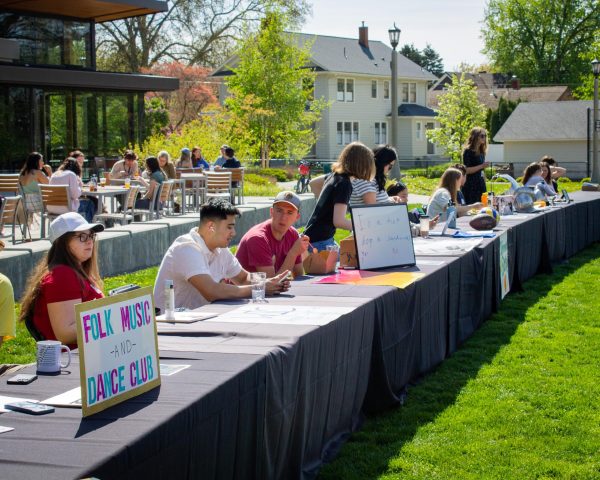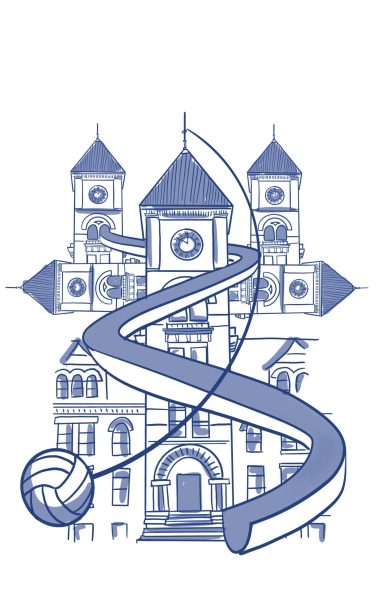“More flexibility”: Faculty raise concerns over college management
October 8, 2020
As Whitman faces a year like no other, some faculty members have expressed concerns over the shifting priorities of the college management.
In August, Whitman’s chapter of the American Association of University Professors (AAUP) released a letter titled “The Long-Term Costs of Short-Term Cuts: Why Austerity Alone Will Not Get Us Out of the Multi-Year Crisis Ahead.” The letter challenged the administration’s policies of austerity in the face of the coronavirus crisis. As The Wire reported on Sep. 10, the administration has compromised with AAUP demands on tiered salary cuts and postponement of mandatory furloughs. However, the administration has still proceeded to cut retirement benefits indefinitely, in addition to eliminating nine staff positions and opting not to fill several vacant ones. Given these facts, the AAUP considers these negotiations to be a “medium-sized win.” Still, the problems addressed by the AAUP letter extend beyond the particulars of salary cuts or retirement benefits.
“The problem is not one of will or kindness, it is a misguided belief that we can cut our way out of the multi-year crisis ahead — a magical hope that tightening belts in the short-term will bring us to a place where we can go back to normal eventually,” the August AAUP letter reads. “Cuts will be necessary, that goes without saying. But the liberal arts colleges that survive this existential crisis will be the ones that seize the moment to invest in their people, communities and long-term future. This is the time for bold actions that protect our people and make Whitman the kind of distinctive college that the shrinking pool of liberal arts students will want to choose, long into the future.”
At the center of this discussion is the use of endowment funds. Since 1999, Whitman’s endowment has more than doubled from $227 million to $539 million. The sense is that Whitman can do one of two things during this crisis: It can either minimize the use of its endowment while making drastic cuts, or it can dip further into the unrestricted portion in order to make less-drastic cuts that still allow educators to carry out their work in full confidence. The AAUP letter makes a case for the latter and argues that the very purpose of such an ample endowment as ours is that it provides the means for us not only to survive but to thrive through moments of crisis and financial uncertainty.
“We have more than a half-billion-dollar endowment (roughly a third of which is unrestricted), substantial quasi-endowments, and the opportunity to borrow money at historically low rates,” reads the August AAUP letter. “Drawing on these resources is complicated, increases certain risks, and has consequences for future spending — but, weighed against the harms done by an austerity-only approach to the crisis, it’s worth much more careful consideration than it has received from our single-minded decision-makers. Endowments and other funds exist to ensure inter-generational equity, but there is no inter-generational equity if there are no future generations.”
One particularly contentious point is the issue of shortened contracts for non-tenure-track (NTT) faculty. Non-tenured faculty will now only be able to renew their positions with 1-year contracts. Provost and Dean of the Faculty Alzada Tipton confirmed this policy change in an email to The Wire.
“[There has been a] change in contracts for existing senior-level non-tenure-track faculty. These are not new faculty, but faculty who have taught for us before,” Tipton said. “Before, we had been able to offer multi-year contracts to full-time non-tenure-track faculty who went through the promotion review to make it to the senior level. Now, as those contracts expire, we will be replacing them with one-year contracts, in order to give the college more flexibility.”
An anonymous faculty member expressed frustration at the change.
“Non-tenure track faculty members can no longer have more than 1-year contracts … and the language used is that it makes us ‘flexible’ — it’s corporate talk,” the professor said. “It is particularly frustrating for faculty because we are the producers of the ‘product’ that the college sells, the education. … The academic program, when I came here, was absolutely the center of the college, and I don’t feel like it is anymore. In fact, if you listen carefully to the rhetoric coming out of Mem, it’s about the Whitman ‘experience,’ they don’t even use the word ‘education.’”
The AAUP echoed this sentiment in their August letter.
“Many of us ‘Adjuncts’ do first year and major advising, and provide real service to the college. To put us on a list of the expendable, because we don’t have a multi-year contract, flies in the face of the very values that the College professes to hold dear,” the letter reads.
Faculty contracts aren’t the only area into which the logic of “flexibility” has been incorporated. The Wire published a Sept. 17 article detailing the administration’s potential plans for outsourced corporate management of the bookstore, a move to increase efficiency. Faculty are concerned with how the concepts “flexibility” and “efficiency” might be used to further cut funding for programs and salaries. This has created a feeling of uncertainty and fear among some faculty members.
“Faculty, staff and administration have been given pay cuts, often in combination with more responsibilities…which I can personally verify,” Professor of Art Justin Lincoln said. “This has been very dispiriting and stressful for many. Many recent and rapid changes from administration make more and more people feel increasingly precarious…which makes long-term thinking even more difficult. It makes some people feel like we are in a state of emergency. The extended quarantine and national turmoil, both socially and economically amplify that kind of anxiety.”
There is also the sentiment among faculty that the college administration is concerned with different goals — that there is little overlap on how the college should move forward. The anonymous professor quoted earlier expressed their opinion as to the nature of administration-faculty relations and the resulting trends in governance.
“For me personally, confidence in the leadership is at an all-time low, and I’ve heard this from a lot of colleagues — and part of that is the sense that the [administration’s] consultation [of faculty] is, frankly, bullshit,” the anonymous professor said, “that we’re being consulted so they can check a box and say ‘look we consulted you,’ but no one thinks this is actually making a difference in terms of decisions. And that’s part of, it seems to me, one of the really distinct differences between an academic or a college culture and a corporate culture — which is that communication is about monologue and PR spins, it’s not about dialogue.”
Along similar lines, faculty feel pressure to curate and brand their curriculums according to marketing standards from the administration.
“I feel like communications is about marketing and faculty are increasingly encouraged to market or package their teaching,” Lincoln said. “Many faculty are adverse to this redirection of their energy. I wish that there was a better understanding from communications about what and why we are teaching. Clearly, these are distinctly different perspectives.”
While this academic year is necessarily different from those in the past, some faculty are concerned more about the shift they are seeing in the management of the college.
“The virus model works really well [to describe these trends],” the anonymous professor said. “This is the virus that’s threatening Whitman and liberal education, not coronavirus.”
On Oct. 8, The Wire reached out President Kathy Murray for a response to the contents of this article. We received an email from President Murray on Oct. 10:
“The conjecture that the priorities of Whitman’s administration have changed is false. We continue to prioritize a high-quality, relevant liberal arts education for our students. What has changed is the context of the world that we are part of, because of COVID, and because of changing preferences, demographics, and needs among college-aged students. Whitman has, throughout its history, adapted to these kinds of changes in our world and we will continue to do so.
In these challenging times, we have also pledged to include faculty in the hardest of these decisions. Faculty are elected by their peers to participate in a number of relevant roles and committees. The chair of the faculty is a member of the President’s Cabinet and participates in meetings of the board of trustees. Division chairs also participate in trustee meetings. Faculty representatives are involved in decision-making across many committees including the budget advisory committee and the coronavirus task force, among others.
What we won’t do at this point, however, is spend down our endowment in a short-sighted attempt to avoid difficult decisions. The anonymous faculty who suggests this is half-right: the size of our endowment is one of the factors that make Whitman more resilient in a moment of financial challenge. What they get wrong is the mechanism for how this works. Rather than spending the principal of our endowment, which makes us financially weaker, it is important to protect these funds, so they continue to generate the returns that Whitman uses to provide financial aid. This aid helps us remain affordable for as many families as possible.”









Patrick Gannon • Oct 9, 2020 at 7:47 am
Interesting article Michael. More examples could have been made about how the “corporate” culture has taken over the learning culture that Whitman has been known for. But the point you made about not using the half billion dollar endowment for these “rainy days” of the pandemic is well taken. Also shortening the contracts for adjunct faculty to only one year would obviously send a chill through the ranks of those professors. It triggers a lack of security. You wonder if those faculty will start looking around for more secure positions. Strained faculty/administration relations is a serious breach that can lead to more division that eventually filters down to the students. President Murray needs to remember that a pandemic can divide people and to be successful, leaders need to bring EVERYONE across the finish line.